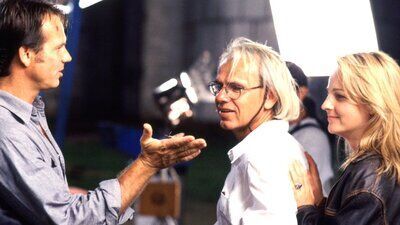Considering how many things could have gone wrong, it’s amazing just how many things go right in James Marsh’s absorbing drama “The Theory of Everything.” Though it never really penetrates the theories behind legendary theoretical physicist Stephen Hawking, or really tries, “The Theory of Everything” is a naturally uplifting film about a gifted scientist who was dealt a seemingly losing hand yet still became one of the most revered minds of the 20th century.
Complete with a spirited performance from Eddie Redmayne, here’s a movie that could have been a somber bore but instead captures the portrait of a man who defied the odds with a smile. “The Theory of Everything” does cut a few corners and never fully takes off, yet it stands as a riveting testament to the man behind the caricature and to the many loved ones who helped him reach his potential.
A secretly charismatic boy with dreams of solving the biggest questions of the universe, Stephen Hawking fits right into the world of geniuses to be found at Cambridge University in the 1960s. Though he has a hard time finding the focus for his thesis, everyone can see that he has all kinds of potential, quietly flashing his brilliancewithout having to be a show-off.
When his motor skills suddenly start to diminish and he ends up falling face-first in the middle of campus, all of a sudden it looks like a potentially great scientist was just snuffed out before he ever really got going. Given a life expectancy of only two years due to a motor neuron disease, Hawking by all rights should have been locked in an unwinnable battle with death. Certainly all of the scientific data was stacked against him.
Yet Hawking comes to grips with the idea of his mortality fairly quickly, recognizing that his healthy brain will still give him a couple years of working out his theories on the origin of the universe. With the help of his devoted wife Jane (Felicity Jones), herself a promising medieval poetry scholar, they dig in for the struggle and do their best to take the disease as it comes, which means a slow deterioration of both his bodily movements and speech. T
hanks to a touching performance from Eddie Redmayne, we come to see Hawking as a man of boundless optimism, the type of guy who doesn’t waste his opportunities to frolic with his young children – even if that means tearing up the living room in his wheel chair. Instead of a sad sack stuck in a chair, Redmayne can’t keep the smirks off his face and shows that his comic wit is still very much intact, pointing to a man who managed to lift the spirits of those around him no matter how dire his own situation became.
One of the wonderful things about “The Theory of Everything” is that it never manufactures a bad guy, as is so common in movies of its kind. A lesser movie may have found a stuck-up firebrand for Hawking to compete against, but instead screenwriter Anthony McCarten (along with a novel from Hawking’s wife Jane Hawking) understands that a cartoonish villain isn’t what the story needs.
Though the movie does point out that there was serious opposition to Hawking’s ideas, it also never cheapens itself by pandering to the typical formula. When the story adds a male caretaker (Charlie Cox) who is attracted to Stephen’s wife into the mix, it sidesteps the usual clichés and avoids the heavy melodrama wherever possible.
If there is something that “The Theory of Everything” doesn’t manage to do it’s getting to the essence of Hawking’s actual work, which is touched on with only broad strokes that ultimately limits the impact. Director James Marsh, who won an Oscar for his brilliant documentary “Man on Wire,” succeeds in capturing the romanticized nostalgia of Cambridge in the 1960s without going overboard visually, but the movie also struggles in trying to visualize Hawking’s theories and ends up on the outside looking in.
“The Theory of Everything” clearly is meant to be a character piece above all, but the driving force behind Hawking’s intellect is never fully realized and we don’t end up with a great deal of insight into why his work was so well-revered on its own.
Even with some limitations, however, it’s hard to leave “The Theory of Everything” without respect for both the man and the surrounding helpful hands who allowed his life to flourish. Instead of monotone scenes chock-full of fabricated emotion, as we’ve seen many times with inspirational biopics, “The Theory of Everything” focuses on the spirit of Hawking above all. Here’s a man who has the nerve to laugh at the absurdity of his decaying body, realizing that a healthy mind this advanced is all the gift he ever needs.
At the end of the day, “The Theory of Everything” earns the emotional scenes it develops and, against the odds, manages to stay as upbeat as Hawking no matter how bleak the outlook. Far from a retread of the “Beautiful Mind” formula, here is a movie that captures the essence of an icon without ever having to reach for the lowest common denominator.






Leave feedback about this